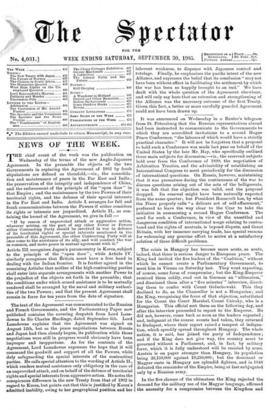The crisis in Hungary has become more acute, so acute,
indeed, that there is serious danger to European peace. The King had invited the five leaders of the "Coalition," without which he cannot create a Parliamentary Government, to meet him in Vienna on Saturday last. They went expecting, of course, some form of compromise ; but the King-Emperor received them coldly, read out in German an "ultimatum," and dismissed them after a " five minutes " interview, direct- ing them to confer with Count Goluchowski. This they declined to do, as the Chancellor is not a Hungarian ; and the King, recognising the force of that objection, substituted for the Count the Court Marshal, Count Cziraky, who is a Hungarian. This official met them on the following day, and after the interview proceeded to report to the Emperor. He did not, however, come back as soon as the leaders expected ; and, indignant at the course events had taken, they returned to Budapest, where their report raised a tempest of indigna- tion, which speedily spread throughout Hungary. The whole nation, it is said, has joined the party of Independence ; and if the King does not give way, the country must be governed without a Parliament, and, in fact, by military force, which it is fully understood will be resisted by arms. Austria is on paper stronger than Hungary, its population being 26,150,000 against 19,250,000; but the dominant or Magyar caste in Hungary are splendid fighters, and in 1848 defeated the remainder of the Empire, being at last subjugated only by a Russian army.
In the five clauses of the ultimatum the King rejected the demand for the military use of the Magyar language, affirmed the necessity for a compromise between the Kingdom and










































